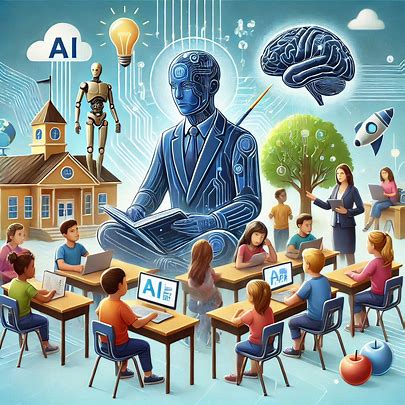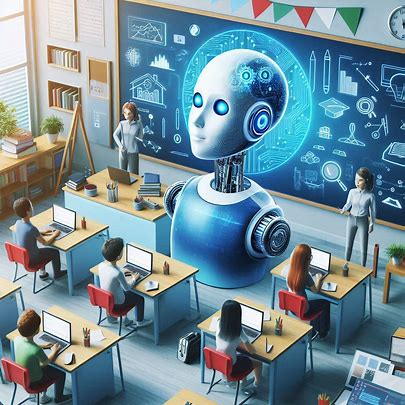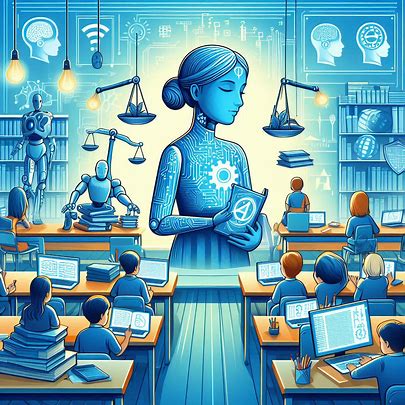AI Ethics in Schools
Artificial Intelligence (AI) is rapidly transforming the educational landscape, offering unprecedented opportunities for personalized learning, administrative efficiency, and innovative teaching methods. However, with these advancements come significant ethical challenges that educators, students, and policymakers must address. This article explores the latest developments in AI ethics in schools, focusing on its implications for teaching and learning. We will delve into the ethical principles, challenges, and strategies for integrating AI responsibly in education, ensuring that its use aligns with the values of fairness, accountability, and inclusivity.
Introduction to AI in Education
AI technologies are increasingly being integrated into classrooms, from adaptive learning platforms to automated grading systems and virtual teaching assistants. These tools have the potential to revolutionize education by tailoring learning experiences to individual students’ needs, providing real-time feedback, and reducing administrative burdens on teachers. However, the ethical implications of these technologies cannot be overlooked.The ethical use of AI in education requires careful consideration of issues such as data privacy, algorithmic bias, transparency, and the potential for misuse. As AI becomes more prevalent, schools must adopt frameworks and guidelines to ensure its responsible use in teaching and learning environments.

The Role of AI in Teaching and Learning
1. Personalized Learning
AI-powered tools can analyze vast amounts of data to create personalized learning experiences for students. For example, adaptive learning platforms can identify a student’s strengths and weaknesses and adjust the curriculum accordingly. While this approach can enhance learning outcomes, it raises concerns about data privacy and the potential for bias in algorithms
1.
2. Administrative Efficiency
AI can automate routine administrative tasks, such as grading assignments, scheduling, and managing student records. This allows teachers to focus more on instruction and student engagement. However, the reliance on AI for such tasks must be balanced with human oversight to ensure fairness and accuracy.
3. Enhancing Teacher Support
AI can serve as a valuable tool for teachers by providing insights into student performance, suggesting instructional strategies, and even offering professional development resources. However, educators must be trained to use these tools effectively and ethically.
Ethical Challenges of AI in Education
1. Data Privacy and Security
AI systems in schools often rely on collecting and analyzing student data. This raises significant concerns about data privacy and security. Schools must ensure that data is collected, stored, and used in compliance with privacy laws and ethical standards.
2. Algorithmic Bias
AI algorithms are not immune to bias. If the data used to train these algorithms is biased, the resulting AI systems can perpetuate and even amplify these biases. For example, an AI tool used for grading might unfairly disadvantage certain groups of students based on gender, race, or socioeconomic status.
3. Transparency and Accountability
AI systems often operate as “black boxes,” making it difficult to understand how decisions are made. This lack of transparency can undermine trust in AI tools and make it challenging to hold developers and users accountable for their actions.
4. Equity and Access
Not all schools have equal access to AI technologies. This digital divide can exacerbate existing inequalities in education, leaving disadvantaged students further behind. Ensuring equitable access to AI tools is essential for promoting fairness and inclusivity.
5. Autonomy and Agency
The use of AI in education must not undermine the autonomy and agency of students and teachers. Over-reliance on AI tools can lead to a passive learning experience for students and reduce teachers’ professional judgment.
Ethical Principles for AI in Education
To address these challenges, several ethical principles have been proposed for the use of AI in education:
1. Fairness
AI systems must be designed and implemented to promote fairness and avoid discrimination. This includes addressing biases in data and algorithms and ensuring that AI tools are accessible to all students.
2. Accountability
Educators, developers, and policymakers must be accountable for the ethical use of AI in schools. This includes establishing clear guidelines and mechanisms for monitoring and evaluating AI systems
3.
3. Transparency
AI systems must be transparent in their design and operation. Students, teachers, and parents should have a clear understanding of how AI tools work and how decisions are made.
4. Privacy and Security
Protecting student data is paramount. Schools must implement robust data protection measures and ensure that AI systems comply with privacy laws and ethical standards.
5. Inclusivity
AI tools must be designed to promote inclusivity and address the needs of diverse learners. This includes ensuring that AI systems are accessible to students with disabilities and those from marginalized communities.

Strategies for Ethical AI Integration in Schools
1. Developing Ethical Guidelines
Schools and educational institutions should develop clear ethical guidelines for the use of AI in teaching and learning. These guidelines should address issues such as data privacy, algorithmic bias, and transparency.
2. Training Educators
Teachers must be trained to use AI tools effectively and ethically. This includes understanding the limitations of AI, recognizing potential biases, and ensuring that AI tools are used to complement, not replace, traditional teaching methods.
3. Engaging Stakeholders
The ethical use of AI in education requires collaboration among all stakeholders, including students, parents, teachers, policymakers, and developers. Engaging stakeholders in the development and implementation of AI tools can help ensure that these tools meet the needs of the educational community.
4. Promoting Digital Literacy
Students must be taught how to use AI tools responsibly and critically. This includes understanding the ethical implications of AI and developing the skills needed to navigate an increasingly AI-driven world.
5. Monitoring and Evaluation
Schools must establish mechanisms for monitoring and evaluating the use of AI tools. This includes assessing their impact on student learning, identifying potential ethical issues, and making necessary adjustments.
Case Studies: Ethical AI in Action
1. MIT Media Lab’s AI and Ethics Curriculum
The MIT Media Lab has developed an AI and Ethics curriculum for middle school students. This curriculum introduces students to the risks and ethical implications of AI systems through collaborative, critical thinking activities. It serves as an excellent example of how schools can integrate ethical AI education into their curricula.
2. European Commission’s Ethical Guidelines
The European Commission has developed ethical guidelines on the use of AI and data in teaching and learning as part of its Digital Education Action Plan. These guidelines provide a framework for educators to use AI responsibly and effectively.
The Future of AI Ethics in Education
As AI continues to evolve, its role in education will only grow. To ensure that AI is used ethically and responsibly, schools must adopt a proactive approach to addressing the ethical challenges associated with these technologies. This includes developing ethical guidelines, training educators, engaging stakeholders, and promoting digital literacy. By prioritizing ethics, schools can harness the potential of AI to enhance teaching and learning while safeguarding the rights and interests of students and educators.

FAQs
1. What is AI ethics in education?
AI ethics in education refers to the principles and practices that guide the responsible use of AI technologies in teaching and learning. It addresses issues such as data privacy, algorithmic bias, transparency, and equity.
2. Why is AI ethics important in schools?
AI ethics is important in schools to ensure that AI tools are used responsibly, fairly, and inclusively. It helps protect student data, prevent discrimination, and promote trust in AI technologies.
3. What are the main ethical challenges of AI in education?
The main ethical challenges of AI in education include data privacy and security, algorithmic bias, transparency, equity and access, and the potential loss of autonomy and agency for students and teachers.
4. How can schools address ethical challenges in AI?
Schools can address ethical challenges in AI by developing ethical guidelines, training educators, engaging stakeholders, promoting digital literacy, and establishing mechanisms for monitoring and evaluation.
5. What are some examples of ethical AI in education?
Examples of ethical AI in education include the MIT Media Lab’s AI and Ethics curriculum and the European Commission’s ethical guidelines on AI and data in teaching and learning.
6. How can teachers use AI ethically in the classroom?
Teachers can use AI ethically in the classroom by understanding the limitations of AI tools, ensuring transparency, protecting student data, and using AI to complement traditional teaching methods.
7. What is the role of policymakers in promoting AI ethics in education?
Policymakers play a crucial role in promoting AI ethics in education by developing regulations, providing funding for ethical AI initiatives, and supporting research on the ethical implications of AI in schools.
Summary
This article provides a comprehensive overview of the latest developments in AI ethics in schools, highlighting the opportunities and challenges of integrating AI into teaching and learning. By adopting ethical principles and strategies, schools can ensure that AI technologies are used responsibly and effectively to enhance education.
